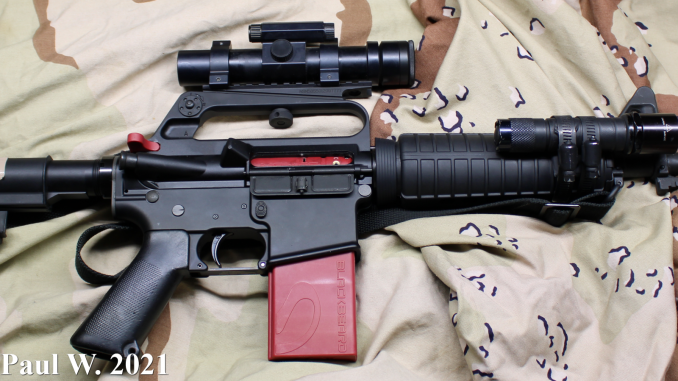
It goes without saying, but dryfire is an extremely important part of improving as a shooter. Most of our growth comes from quality repetition, and dryfire is the most economical route to that. The hardest part of dryfire has always been to obtain qualitative data from it. Without frequent dryfire sessions and then trips to the range, how would you know that you are improving?
Well, Mantis is a company that has been making tools that make your dryfire sessions easier to codify. Their “Mantis X” line allowed for precise tracking of trigger press and movement of the gun, along with leaderboards to track progress. They’ve recently released a new product, the Blackbeard, which desires to offer a different type of assistance for dryfire. How does it work, and does it work well?
What is the Mantis Blackbeard?
The Mantis Blackbeard is a drop-in dryfire tool made specifically for the AR15 platform. It is a bolt carrier group (BCG) replacement, with a battery pack that fits into the AR’s magazine well. With both the BCG replacement and the battery installed, the Blackbeard will do the following (depending on model):
- Auto-reset the AR’s trigger during dryfire
- Shoot a laser out of the BCG, to show hits or misses during dryfire (optional upgrade)
The aim of the Blackbeard is to make it that you can dryfire your AR, but without needing to rack the charging handle after every trigger press to reset the trigger. When the trigger is pressed, the BCG segment gets sent electricity via the battery, which then kicks a little arm out of the BCG segment, which pushes the hammer back to being reset. It is really nifty!
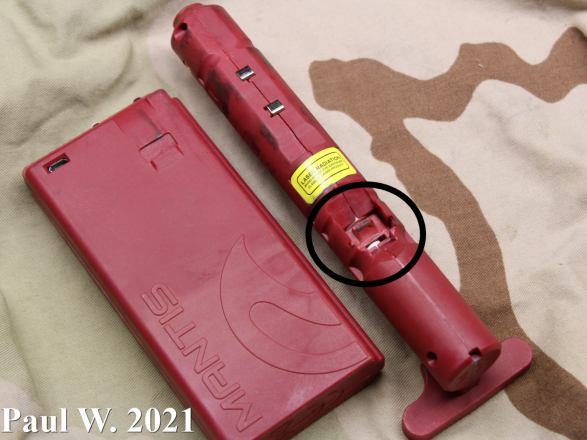
As a secondary goal, Mantis sells Blackbeards that have built in lasers (red, green, and infrared). With those models, a press of the trigger will have the Blackbeard shoot a laser out of the BCG, and hit your target. The laser allows for showing where you hit, or rather, where you miss. Mantis’ app for their “Laser Academy” also allows for using targets that can be used in conjunction with a cell phone to track hits. Pretty nifty stuff, but all optional.
The base model Blackbeard runs $199, with the red laser version going for $219, and the green and IR going for $249. Mantis sent me the green laser version to test & evaluate for this review.
Installing the Mantis Blackbeard
While not really related to installing the Blackbeard, I do want to point out how it ships. While I’m not a fan of a lot of cases, I like the one that the Blackbeard comes with. The fabric and foam case holds the Blackbeard well, and is a nice place to put your BCG and CH when using the Blackbeard.
Installing the Mantis Blackbeard is really, really simple. Once you clear and unload your AR, pop your rear takedown pin. Then, simply remove your BCG and charging handle, and insert the Blackbeard BCG. For closing the upper onto the lower, it may require a bit more clamping, as the Blackbeard has a tight fit. Once the upper and lower receivers are mated again, insert the battery pack into the magwell, and you are ready to use the Blackbeard!
The battery pack does need to be charged from time to time (duh), but Mantis includes the USB micro cable needed to do so. I found that from a full charge to dead, I got about a good 5 nights of a lot of dryfire out of the Blackbeard. With the non-laser model, battery life should be better.
Speaking of the laser, I did not bother with a super-precise zeroing of it. I roughly boresighted it with each AR, which was good enough for my uses.
I tested the Blackbeard in a handful of ARs, which will be listed below:
- Bushmaster Upper/Anderson Lower, Hiperfire EDT Sharpshooter Trigger
- B.A.D. Upper/Brownells KP15 Lower, Mil-Spec Trigger
- PWS MK111 PRO Upper/Aero M4E1 Lower, LaRue MBT 2S Trigger
- BCM Upper/Spikes Lower, KE ARMS SLT-2 Trigger
- TNTE Upper/Brownells 601 Lower, Geissele SSP Trigger
I’m happy to report that the Blackbeard functioned in all of my test guns. Speaking of function, how well did it work?
Using the Mantis Blackbeard
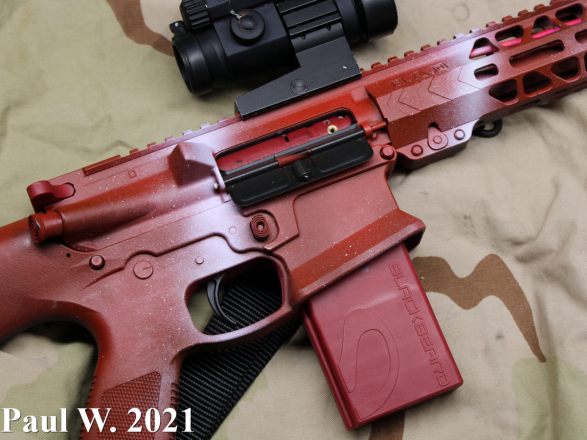
Well, this is a pretty simple section. The Blackbeard does what it advertises to do. When installed with a charged battery, every trigger press will reset the hammer, and fire the laser. It worked for every one of the many thousands of trigger presses I did during the testing period. Trigger pull was also not effected by the Blackbeard, with weight being consistent to normal dryfire presses.
You are able adjust the laser and toggle its modes through the ejection port on the AR. There is a slider for momentary and constant laser settings, and two holes for windage and elevation zeroing. A minor, but welcome feature is that lack of a recess point for the dust cover on the Blackbeard. You cannot close the dustcover when using the Blackbeard, and I love this. For training environments, this is an excellent feature, as you’ll be able to see that the Blackbeard is installed from a distance.
The laser model offers something great, which is being able to account for height over bore (HOB). HOB is the distance between the aiming reticle of an optic, and the bore of the firearm. HOB is something that I don’t think that shooters think about enough, especially in the era of tall optic mounting on ARs. I think that the Blackbeard is an excellent training device to help shooters understand and overcome HOB, as you can literally see the distance between the laser and optic at closer distance.
The Mantis Blackbeard works, however I wanna outline some areas where I think it would excel as a training tool.
Areas of Use for the Mantis Blackbeard

I’m sold on the Blackbeard for individual use. That being said, I think that it would make for an excellent instruction tool too. I think that civilian/military/law enforcement trainers could get a lot out of the Blackbeard, specifically the laser models.
The Blackbeard does an excellent job at making the dryfire process easier. Removing the need to rack the bolt each trigger press is a massive time saver. Time is money, and it adds up quickly, especially when instructing a large class of students.
I’m loving the Blackbeard laser. The ability to train close range holdovers to account for HOB is invaluable. I have seen so many people not account for bore offset when shooting at close distance, and either miss their target, or even shoot barriers. The modern AR can be an excellent self defense tool, and HOB would certainly need to be accounted for in that role.
The Blackbeard would be a very easy way to show HOB during a class, as an instructor could simply use it, and show the difference between point of aim, and point of impact. HOB is an easy thing to account for, if you know that it exists. The Blackbeard would help a trainer impart HOB adjustments onto students, which would lead to a lot more hits, and much less negligent damage.
I can see the Blackbeard also being a replacement for “blue guns” in training situations. A standard AR can be converted to a training gun in less than a minute with the Blackbeard, and is now a more accurate representation of an actual AR. Hell, maybe even make the Blackbeard work for force-on-force training. Maybe we can see an alteration of MILES Gear to make that work to show hits on foes. Ok, a little pie in the sky, but I can dream. My point here is that I see a lot of future potential with the Blackbeard.
The Verdict on the Blackbeard
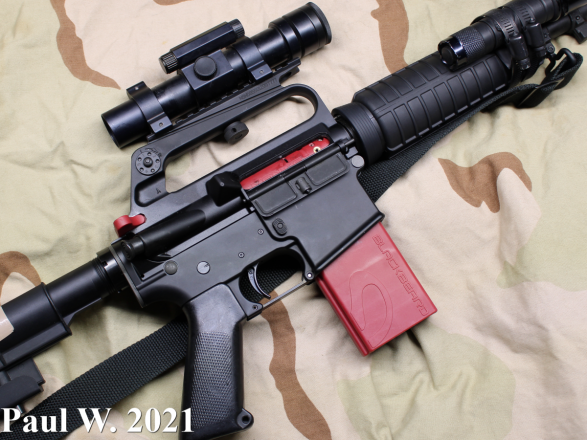
The Mantis Blackbeard is something that I am very happy to have been able to test. I like it a lot more than I expected. The high price is my only gripe, but think of it as investing into your improvement as a shooter. If you want to purchase a Blackbeard, I’d recommend one of the visible laser models. I think that the auto-resetting trigger is the main offering, but the ability to see hits, and practice HOB offset is nearly as important. I’ll be happy to keep using the Blackbeard as time pushes on.
Want to buy your own Mantis Blackbeard? You can find yours >>HERE<<




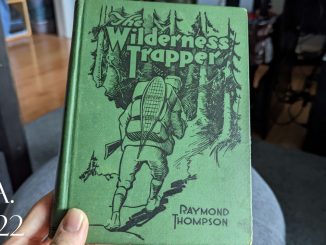
Be the first to comment